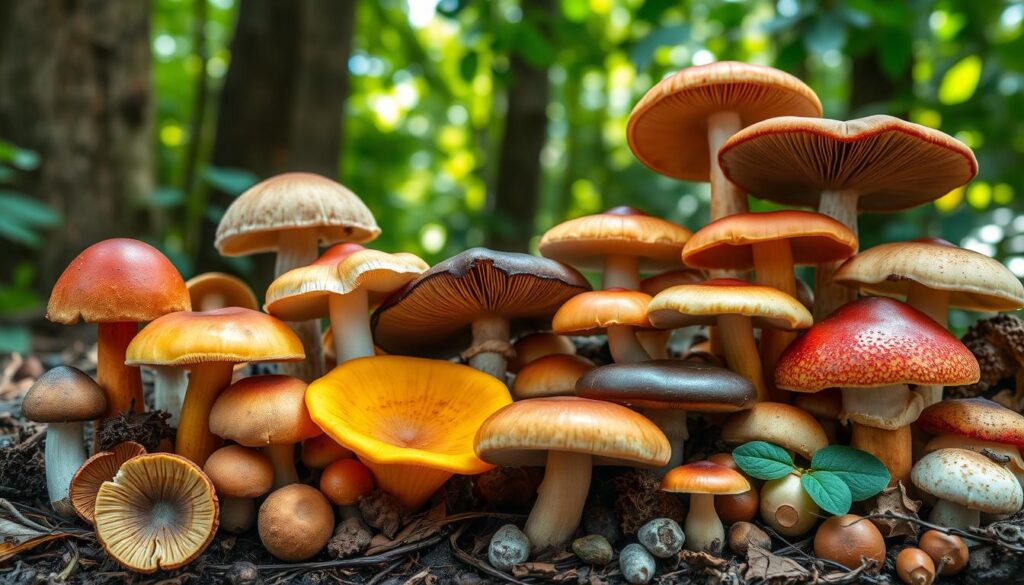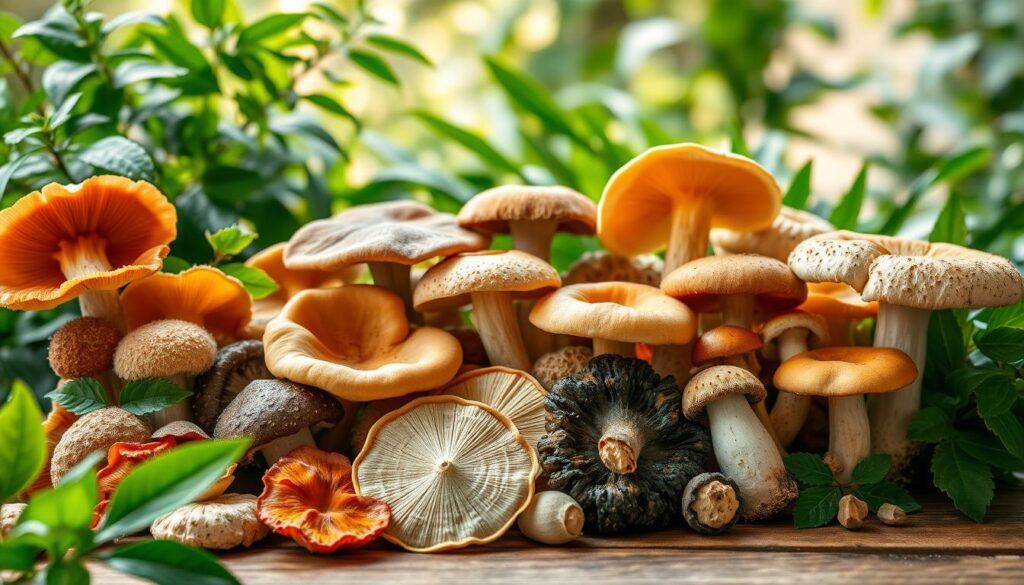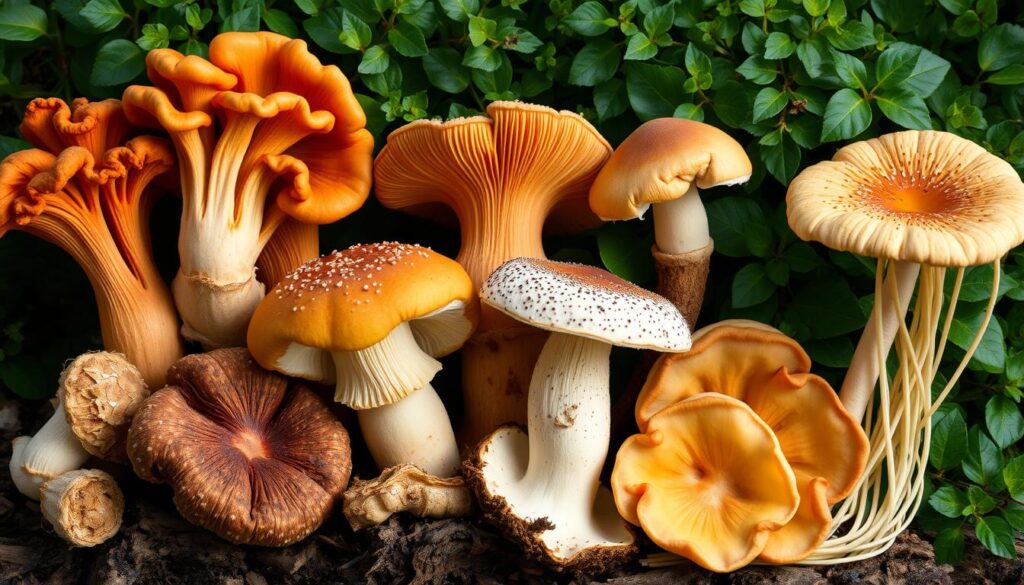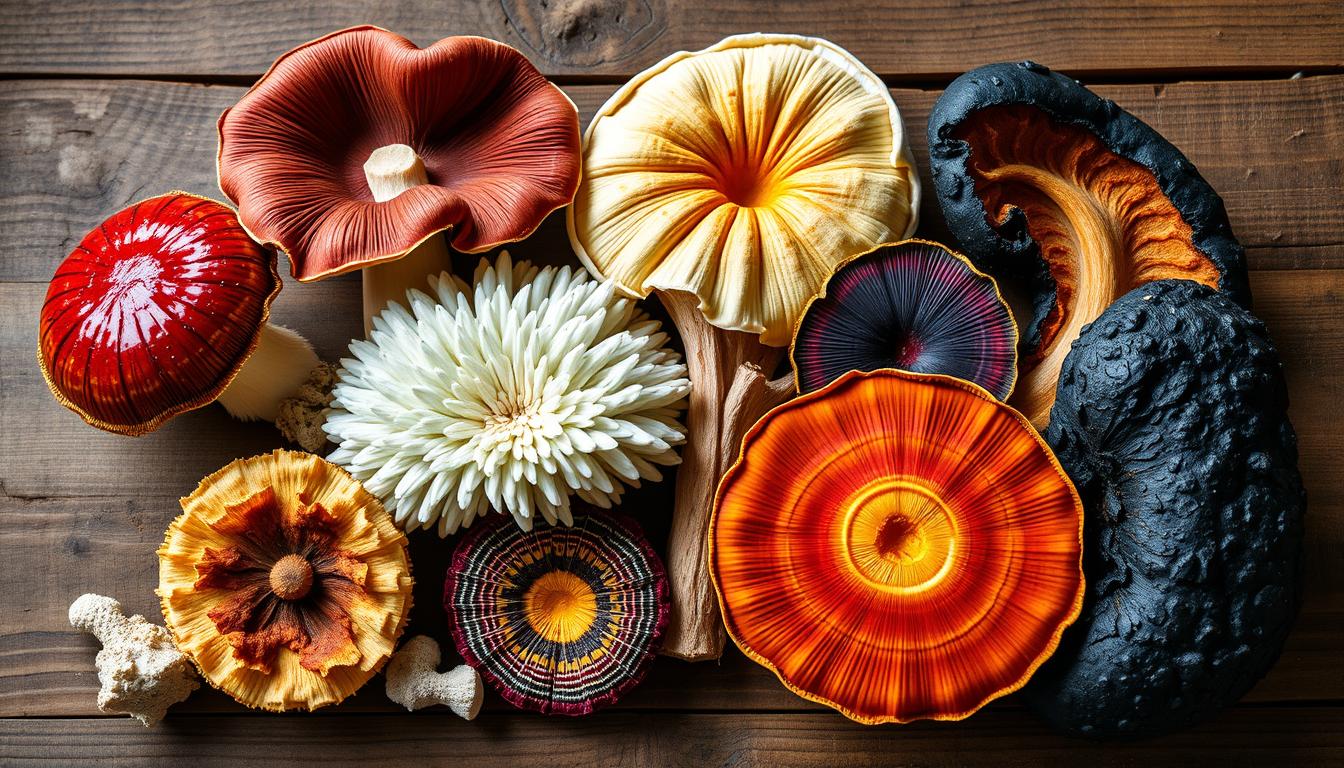The average American consumes about three pounds of mushrooms annually. Mushrooms offer savory flavor with minimal fat, calories, and sodium. Research from 1966 to 2020 shows that consuming just 18 grams of mushrooms daily may reduce cancer risk by up to 45%. Mushrooms contain ergothioneine, a powerful antioxidant that prevents cellular damage. Various mushroom types, including shiitake, oyster, maitake, and king oyster, have higher ergothioneine content.
Key Takeaways
- Mushrooms are a rich source of essential nutrients like fiber, protein, vitamins, and minerals.
- Certain mushroom varieties contain powerful antioxidants that can reduce the risk of chronic diseases.
- Consuming just a small amount of mushrooms daily may provide substantial health benefits.
- Medicinal mushrooms have a long history of use in traditional healing practices around the world.
- Modern research has uncovered a wide range of therapeutic properties associated with various mushroom species.
Understanding Medicinal Mushrooms and Their Impact on Health
Medicinal mushrooms have a long and rich history, woven into the fabric of ancient cultures across the globe. From traditional Chinese medicine to ancient Egyptian, Greek, and Roman practices, these remarkable fungi have been utilized for their protective and restorative properties against infectious diseases and cancers.
The Ancient History of Mushroom Medicine
The use of medicinal mushrooms dates back thousands of years. In 1991, a 5,300-year-old mummy, known as Ötzi the Iceman, was discovered carrying birch polypore fungus, suggesting its potential use for treating intestinal parasites. This remarkable discovery underscores the deep-rooted traditions of employing medicinal mushrooms for health and wellness.
Modern Scientific Research on Mushroom Benefits
Today, modern scientific research has shed light on the remarkable health benefits of superfood mushrooms. Studies have shown that these fungi provide an array of nutrients and bioactive compounds associated with various positive health effects, particularly in supporting the immune-boosting system.
Key Bioactive Compounds in Medicinal Mushrooms
With an estimated 14,000 to 22,000 known mushroom species worldwide, approximately 20 to 30 are cultivated as edible varieties, and 15 are commonly wild-foraged for consumption. These medicinal mushrooms contain a wealth of beneficial compounds, including:
- Polysaccharides, such as α- and β-glucans, contributing to immunomodulatory effects
- Terpenes and terpenoids, exhibiting immune-stimulating, anti-inflammatory, and antioxidant properties
- Fungal proteins, including immunomodulatory proteins and lectins, with cytotoxic, anticancer, and immune-enhancing activities
- Phenolic compounds, antioxidants, laccases, and fatty acids, all of which contribute to the overall health benefits
The wealth of bioactive compounds found in medicinal mushrooms highlights their potential to support various aspects of human health, from immune system function to cognitive performance and beyond.

The Science Behind Mushroom’s Healing Properties
Mushrooms are more than just a culinary delight – they are a treasure trove of beneficial nutrients and bioactive compounds that contribute to their remarkable health benefits. From fiber and protein to essential vitamins, minerals, and antioxidants, these antioxidant-rich mushrooms offer a host of therapeutic properties that have caught the attention of the scientific community.
One of the key players in mushroom’s healing powers is the polysaccharide β-glucan. This compound, found abundantly in the cell walls of many medicinal mushrooms, has been extensively studied for its immune-stimulating and prebiotic effects. By enhancing the activity of natural killer cells and promoting the growth of beneficial gut bacteria, β-glucan helps strengthen the body’s natural defenses against various health challenges.
Moreover, mushrooms contain an array of bioactive components, including alkaloids, flavonoids, terpenes, and phenolic compounds, which possess potent antioxidant, anti-inflammatory, and antimicrobial properties. These compounds work synergistically to combat oxidative stress, reduce inflammation, and ward off harmful pathogens, making mushrooms a powerful ally in the maintenance of overall well-being.
“Mushrooms are the only non-fortified vegan dietary source of vitamin D, a nutrient essential for bone and immune health.”
Interestingly, when exposed to ultraviolet light, many mushroom varieties can synthesize vitamin D, transforming them into a rich source of this vital nutrient. This unique ability makes mushrooms an excellent choice for those seeking plant-based sources of vitamin D to support their overall health.
The medicinal mushroom research continues to uncover a wide range of potential therapeutic applications, from anti-cancer and neuroprotective effects to cardiovascular and metabolic benefits. As our understanding of these fascinating fungi deepens, the mushroom health benefits are poised to play an increasingly significant role in the pursuit of holistic well-being.

Best Mushrooms for Health: Seven Power-Packed Varieties
The world of mushrooms is a treasure trove of health benefits, offering a wide range of nutritious and versatile options. From boosting immunity to supporting brain function, certain mushroom varieties stand out as true powerhouses for your well-being. Let’s explore seven of the best mushrooms for health:
Reishi: The King of Mushrooms
Reishi, also known as the “king of mushrooms,” has long been revered for its potential to prevent or treat various diseases. This adaptogenic mushroom is renowned for its anti-inflammatory, antioxidant, and immune-enhancing properties, making it a valuable addition to a healthy lifestyle.
Chaga: The Immunity Booster
Chaga mushrooms are a true superfood, brimming with antioxidant polyphenols, betulin, and betulinic acid. These compounds have been associated with anti-cancer effects, making Chaga a potent ally in supporting a robust immune system.
Lion’s Mane: The Brain Enhancer
Lion’s Mane mushrooms are often referred to as the “brain enhancer” due to their ability to promote beneficial gut microbiota growth and reduce colon tissue damage in inflammatory bowel disease. This unique mushroom has also demonstrated promising effects on cognitive function and neuroprotection.
Shiitake: The Heart Protector
Shiitake mushrooms are not only delicious but also highly nutritious. They provide an excellent source of choline, a nutrient essential for heart health and cognitive function. Studies have linked the consumption of shiitake mushrooms to favorable changes in immune compound secretion patterns, making them a potential ally in cardiovascular protection.

“Mushrooms are a true powerhouse of health, offering a diverse array of benefits that can positively impact our well-being in numerous ways.”
Cancer-Fighting Properties of Medicinal Mushrooms
Emerging research reveals the remarkable cancer-fighting potential of certain medicinal mushrooms. A comprehensive review of 17 studies from 1966 to 2020 demonstrates that consuming just 18 grams of mushrooms daily can lower cancer risk by up to 45%. These anti-tumor mushrooms and cancer-fighting fungi are a rich source of the powerful antioxidant ergothioneine, which helps prevent and slow cellular damage.
Some of the most promising medicinal mushrooms for cancer include shiitake, oyster, maitake, and king oyster, which contain higher concentrations of ergothioneine. Further, the Turkey Tail mushroom has exhibited remarkable anti-tumor and anti-metastasis effects in animal studies of breast cancer. Polysaccharide-K (PSK), a proprietary extract of Turkey Tail, is even approved in Japan as a complementary cancer treatment.
Extensive research has been conducted on the therapeutic potential of medicinal mushrooms, particularly in Asian countries. Over 100 types of mushrooms are utilized in traditional Chinese and Japanese medicine to combat various cancers. Trametes versicolor and Ganoderma lucidum are two of the most widely studied cancer-fighting fungi.
- Studies on Trametes versicolor (also known as Coriolus versicolor or Turkey Tail) have shown its potential in treating gastric, breast, colorectal, and lung cancers. A Japanese trial involving 751 gastric cancer patients found that those receiving chemotherapy and PSK lived longer than those receiving chemotherapy alone.
- Ganoderma lucidum (Reishi) has been traditionally used in East Asia to strengthen the immune system of cancer patients undergoing conventional therapies. Laboratory and animal studies have demonstrated its anticancer effects on lung and other types of tumors.
- Maitake mushroom extracts, such as the D-fraction, have shown the ability to enhance the effectiveness of chemotherapy and reduce its side effects when used as an adjunct treatment.
While the FDA has not approved the use of turkey tail or PSK for cancer treatment in the United States, the growing body of research on the anti-tumor mushrooms and cancer-fighting fungi is highly promising. Incorporating these powerful medicinal mushrooms for cancer into one’s diet or as a complementary therapy may offer significant health benefits.

Immune System Support and Enhancement
Medicinal mushrooms are renowned for their remarkable ability to bolster the body’s natural defenses. By modulating both the innate and adaptive immune responses, these incredible fungi can enhance the activity of natural killer cells, increase the production of protective cytokines, and help regulate the delicate balance of the immune system.
How Mushrooms Boost Natural Killer Cells
In an eight-week study, healthy Korean individuals who supplemented with Cordyceps mushroom extract experienced a significant increase in the activity of natural killer (NK) cells, a vital component of the immune system’s frontline defense. These specialized cells play a crucial role in identifying and eliminating threats, making them a crucial asset in the body’s fight against infections and even cancer.
Beta-Glucans and Immune Response
- Mushrooms are rich in beta-glucans, a class of polysaccharides that have been extensively studied for their immune-stimulating properties.
- These bioactive compounds have been shown to enhance the production of cytokines, chemical messengers that orchestrate the body’s immune response.
- Furthermore, beta-glucans from mushrooms like Turkey Tail have been used successfully to control the human papillomavirus (HPV), demonstrating their potent antiviral capabilities.

“Medicinal mushrooms have the remarkable ability to modulate the immune system, enhancing its natural defenses and helping the body maintain a healthy, balanced response to threats.”
By harnessing the power of immune-boosting mushrooms, individuals can unlock the benefits of mushroom immunity and fortify their bodies’ natural immune enhancers, paving the way for optimal health and resilience.
Brain Health and Cognitive Benefits
When it comes to maintaining a sharp, healthy mind, certain brain-enhancing mushrooms have emerged as powerful allies. Among the standouts is the remarkable Lion’s Mane mushroom, which has been extensively studied for its ability to support cognitive function and brain health.
Studies have found that Lion’s Mane can help regulate the immune system and improve the health of individuals with inflammatory bowel disease (IBD). Remarkably, research in Singapore revealed that participants who consumed more than two cups of mushrooms for mental clarity per week had a 50% lower risk of developing mild cognitive impairment (MCI), often a precursor to Alzheimer’s disease.
The neuroprotective benefits of Lion’s Mane don’t stop there. This cognitive health fungi has been shown to boost mood, decrease anxiety, and improve mental capabilities in patients with early-stage dementia. Additionally, the Shiitake mushroom, rich in B vitamins and folate, has been found to enhance brain function in older adults.
| Mushroom | Cognitive Benefits |
|---|---|
| Lion’s Mane |
|
| Shiitake |
|
As the scientific community continues to uncover the remarkable brain-enhancing properties of these cognitive health fungi, the potential for mushrooms for mental clarity to support and protect brain function becomes increasingly clear. By incorporating these powerful mushrooms into our diets, we can take a proactive step towards maintaining a healthy, sharp mind throughout our lives.
Heart Health and Cholesterol Management
Heart disease is the leading cause of death in the United States, making the health benefits of heart-healthy mushrooms a crucial topic. Mushrooms are a rich source of an antioxidant and anti-inflammatory amino acid called ergothioneine, which has been linked to lower triglyceride levels and reduced risk of early death from cardiovascular disease. Varieties like king oyster, maitake, oyster, and shiitake mushrooms are especially high in this beneficial compound.
In addition to ergothioneine, mushrooms contain soluble fiber and beta-glucan, which can help trap cholesterol and triglycerides, leading to lower blood cholesterol levels. Mushrooms are also a natural source of vitamin D, and deficiency in this nutrient has been associated with heart-related problems. Furthermore, mushrooms can be used as a substitute for meat in recipes, reducing the amount of saturated fat and cholesterol intake.
Blood Pressure Regulation
Mushrooms are naturally low in sodium, with a cup of white button mushrooms containing just 5 milligrams of sodium. This low-sodium profile helps to keep blood pressure in a healthy range. In fact, a study from the Culinary Institute of America and UC Davis found that swapping half of the meat for mushrooms in a traditional ground beef recipe can reduce sodium intake by 25% while maintaining the dish’s flavor.
Cardiovascular Protection Mechanisms
Certain cholesterol-lowering fungi, such as shiitake mushrooms, contain compounds that inhibit cholesterol production, block cholesterol absorption, and lower overall blood cholesterol levels. This multifaceted approach to cholesterol management can significantly contribute to cardiovascular health and protection.
In summary, the cardiovascular benefits of mushrooms are extensive, ranging from regulating blood pressure and managing cholesterol to providing essential nutrients that support overall heart health. Incorporating these versatile and heart-healthy fungi into one’s diet can be a valuable step towards maintaining a strong and resilient cardiovascular system.
Antioxidant and Anti-Inflammatory Effects
Medicinal mushroom extracts are packed with powerful antioxidants that help the body neutralize free radicals and stay healthy. Without these antioxidants, the body would be overrun by free radicals, which can contribute to a range of serious health issues, including cancer, Alzheimer’s, heart problems, premature aging, cataracts, and Parkinson’s.
Certain antioxidant-rich mushrooms, like Cordyceps, Reishi, and Chaga, have also been found to possess potent anti-inflammatory properties. Chronic inflammation is closely linked to a variety of health concerns, from type 2 diabetes and depression to Alzheimer’s and more. These anti-inflammatory mushrooms may offer significant benefits for athletes, active individuals, and those struggling with inflammatory conditions such as arthritis, celiac disease, asthma, and skin problems like psoriasis.
Researchers have discovered that the bioactive compounds in these antioxidant-rich mushrooms and anti-inflammatory fungi can help the body reduce oxidative stress and manage inflammation, leading to improved overall health and well-being.
“Medicinal mushrooms are a treasure trove of natural compounds that can help the body fight free radicals and tame inflammation, two key factors in a wide range of chronic health conditions.”
By incorporating these powerful antioxidant-rich mushrooms and anti-inflammatory fungi into your diet or supplement regimen, you can take a proactive step towards supporting your body’s natural defenses and promoting long-term wellness.
Gut Health and Digestive Benefits
Medicinal mushrooms have emerged as powerful allies in promoting gut health and digestive well-being. The polysaccharides found in these probiotic mushrooms stimulate the growth of beneficial bacteria within the gut microbiome. While many foods break down in the stomach’s acidic environment, the unique structure of mushroom polysaccharides allows them to pass through the stomach unaltered, reaching the colon where they can encourage the proliferation of gut-friendly bacteria.
Reishi mushrooms, in particular, have demonstrated the ability to regulate the composition of the gut microbiota, with their polysaccharides exhibiting prebiotic-like effects that can increase the population of beneficial bacteria such as Bifidobacterium. Additionally, a clinical trial has indicated that the consumption of shiitake mushrooms was associated with favorable changes in the secretion patterns of various immune compounds, potentially signaling an improvement in gut immunity and an anti-inflammatory response.
By nourishing the gut microbiome, these probiotic and gut-friendly mushrooms can contribute to overall digestive health, supporting the body’s natural defense mechanisms and promoting a balanced, diverse microbial community within the intestinal tract. As the gut-immune connection continues to be explored, the digestive benefits of medicinal mushrooms offer a promising avenue for optimizing both gut and immune function.
FAQ
What is the average annual mushroom consumption in the United States?
What are the health benefits of consuming mushrooms?
What is the historical use of medicinal mushrooms?
What are some of the key bioactive compounds found in medicinal mushrooms?
How do medicinal mushrooms support the immune system?
What are the cognitive benefits of certain mushrooms?
How do mushrooms support heart health?
What are the anti-inflammatory properties of medicinal mushrooms?
How do mushrooms support gut health?
Source Links
- Top 8 Medicinal Mushrooms For Immune Health
- Medicinal Mushrooms: 7 Kinds and Their Unique Health Benefits
- What Is the Best Medicinal Mushroom? Health Benefits
- 7 health benefits of mushrooms
- Medicinal Mushrooms: Bioactive Compounds, Use, and Clinical Trials
- Health Benefits of Mushrooms
- Explore the Many Benefits of Mushrooms
- Mushrooms: Nutritional value and health benefits
- 5 of the Healthiest Mushrooms You Can Eat, According to a Dietitian
- 6 Mushrooms That Act as Turbo-Shots for Your Immune System
- Mushrooms
- VA.gov | Veterans Affairs
- Medicinal mushrooms in cancer treatment
- Immune Modulation From Five Major Mushrooms: Application to Integrative Oncology
- How Mushrooms Support Immunity (Top 8 Types) – FreshCap Mushrooms
- Mushroom Supplements: How To Naturally Boost Your Immunity with Functional Mushrooms
- Can You Use Mushrooms For Brain Health? | Dr. Will Cole
- What Are the Health Benefits of Lion’s Mane Mushrooms?
- 9 Health Benefits of Lion’s Mane Mushroom (Plus Side Effects)
- 3 Reasons to Eat More Mushrooms for Heart Health
- Ganoderma lucidum mushroom for the treatment of cardiovascular risk factors
- Health Benefits of Reishi Mushrooms
- Mushrooms
- Antioxidant and Anti-Inflammatory Activity of Five Medicinal Mushrooms of the Genus Pleurotus
- The Best Mushrooms for Gut Health: Why Mushrooms are Your Guts New Best Friend
- No title found





